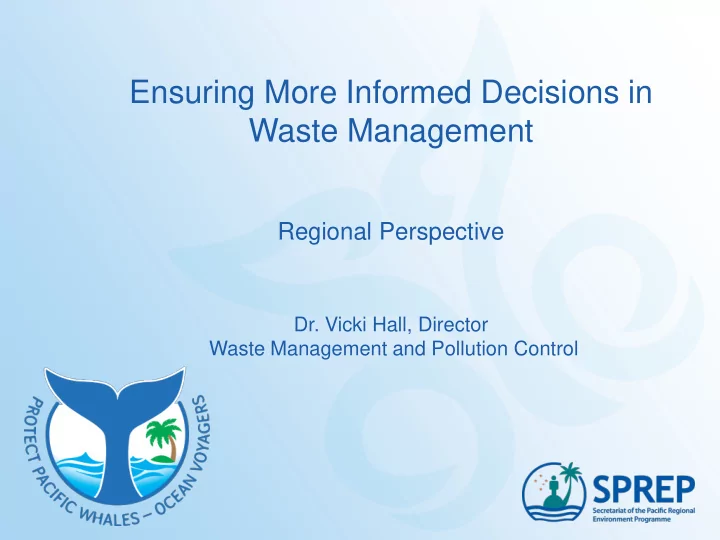

Ensuring More Informed Decisions in Waste Management Regional Perspective Dr. Vicki Hall, Director Waste Management and Pollution Control
Presentation Outline Three aspects covered: 1. Why is reporting important? 2. Key examples – regional and international level 3. How can SPREP assist countries?
Why data is important • Builds the business case for action by knowing the scope of the problem and how your proposed project is the best solution • Tracks the success (or not) of a project – enables prompt action on adverse and unforeseen consequences as well as allows for adjustments to improve the outcomes • Provides the basis for the next business case to continue work, given most projects are prioritised actions, constrained by budget and capacity • Provides the information for evidence-base decision-making – “we can’t manage what we don’t know” • Reporting platform – Leaders decisions and donor expectations – Requirements of National, Regional and International commitments
Leaders Decisions Pacific Leaders 2017 Declarations “to be committed to fast track the development of policies to ban the use of single-use plastic bags, plastics and styrofoam packaging ” Why – need to demonstrate that as a region we are doing our bit to reduce plastic pollution (1% of the global problem) “Everyone’s Problem and Everyone’s Responsibility” “calling on Pacific Rim partners to join and commit to action on addressing marine pollution and marine debris, to maintain the environment integrity of the Pacific Ocean for people, planet and prosperity” Why – - Pacific coastlines are the recipients of plastic pollution from overseas countries and the maritime sector via ocean currents – threat to our culture, food security, economy and health and wellbeing (makes up 99% of the issue faced in the Pacific) Advocacy and engagement on the world stage
International Obligations Sustainable Development Goals (United Nations) • 2030 Agenda – 17 SDGs and 169 targets • adopted 25 Sept 2015 by Heads of State and Government • plan of action for people, planet and prosperity Paris Climate Agreement • By year 2020 – report on actions to meet the obligations under the Agreement within the UN Framework Convention on Climate Change (UNFCCC) dealing with greenhouse gas emissions, mitigation, adaptation and finance • Target 1.5 °C
International Obligations - SDGs
International Obligations Hazardous Wastes • Multilateral environmental agreements – protect human health and the environment from hazardous chemicals and pollutants • Basel, Rotterdam, Stockholme Conventions • Minamata Convention 2017 • Each Convention has an annual work programme – reporting obligations Example: Minamata Convention – reporting on actions taken to reduce the adverse effects of mercury - from bans, the phasing out of use, emission controls, regulation of informal gold mining, storage, disposal and contamination
Regional Conventions Noumea Convention • Protection of the Natural Resources and Environment of the South Pacific Region (1986) – (London Convention for the prevention of Marine Pollution by dumping of wastes and other Matters) • Protocols obliges Parties to endeavour to take all appropriate measures to prevent, reduce and control pollution from any source and to ensure sound environment management and development of natural resources, using the best practicable means at their disposal and in accordance with their capabilities. • Protocol for the Prevention of Pollution of the South Pacific Region by Dumping 1990 (Noumea and IMO Conventions) • Protocol Concerning Co-operation in Combating Pollution Emergencies in the South Pacific Region (1990) Waigani Convention • Ban the importation into Forum Island Countries of Hazardous and Radioactive Wastes and to Control the Transboundary Movement of Hazardous wastes within the South Pacific Region (compare Basel Convention)
Regional Commitments SPREP’s 2017 -2026 Strategic Plan Regional Goal 3: Pacific people benefit from improved waste management and pollution control Objective 1: Minimise the adverse impacts of chemicals and all wastes on human health and the environment Objective 2: Strengthen national, regional and international mechanisms for waste and pollutants Objective 3: Recover resources from waste and pollutants for waste minimization and profit Objective 4: Improve waste and pollution monitoring to enable informed decision-making Cleaner Pacific 2025 is the regional strategy to deliver this mandate
How can SPREP assist countries? SPREP recognises that this is a busy space • potential for duplication of effort especially in terms of meeting regional and international reporting obligations Working with countries to integrate processes: • Monitoring Programme – captures the right information, multiple uses • Data Information Systems • Waste and Pollution data repository with build-in functionality that enables analysis and reporting tailored to different requirements (PacWaste Plus) • INFORM – State of the Environment Reporting • Caveat – data systems need to talk to one another (enter data only once) • Tools to assist in data collection • Apps (Coastal Clean-up on Saturday) • Monitoring stations suitable for the Pacific setting • Infrastructure, facilities, equipment (e.g. weigh bridge at landfills)
Recommend
More recommend